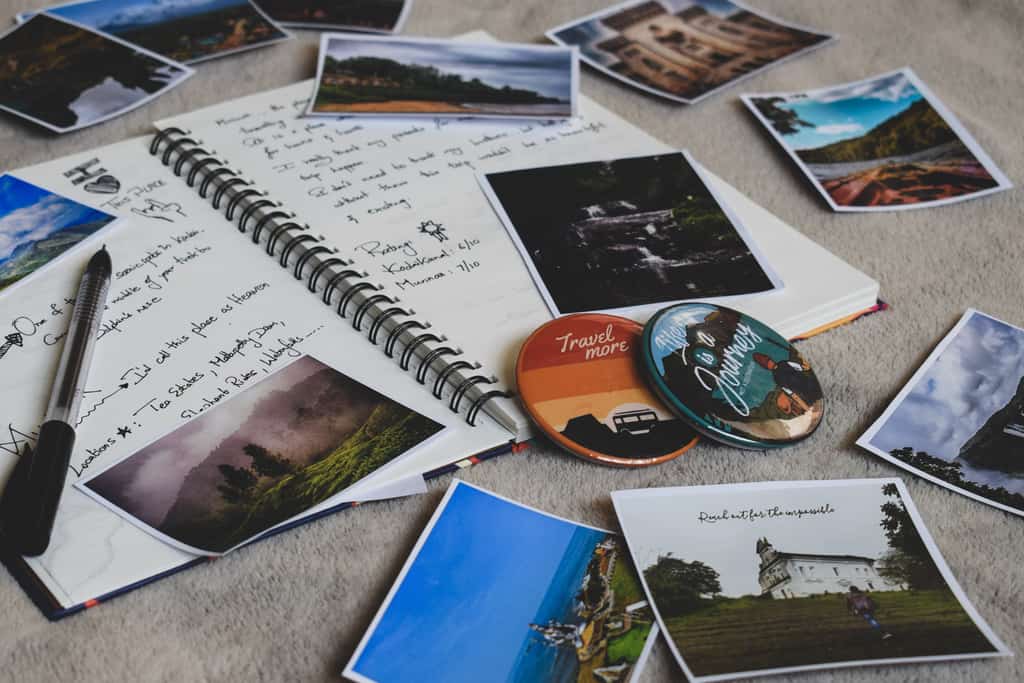To quote Saoirse Ronan in Ladybird, “I wish I could live through something.” 2002 may have only been a palindrome, but living in 2020 certainly constitutes LIVING through something. We are facing unprecedented times, as the news likes to remind us constantly. And if you’re a nurse working on the front lines, you’re in the eye of the hurricane (yes, I have been listening to the Hamilton soundtrack a little too often since it came out on Disney+).
People journal for a lot of different reasons: to keep record of different periods of their life that they can pass down to future generations; to work out their feelings at the end of a rough day; even just to have something to look back on a year from now and think, “Wow, my life was so different then.” All of these reasons feel particularly pertinent today. And if you’re traveling to different nursing placements, every month can feel like a different lifetime.
If you weren’t an avid journaler before, or if you could never picture yourself putting pen to paper every day, this might be the time to reconsider. Here’s a guide to help you get started.
Step 1: Figure out what kind of journaler you want to be
A lot of people are repelled from journaling because they have one idea in their mind of what keeping a journal is. But that’s the beauty of a journal, it’s yours! You can decide to do whatever you want with it. There is no wrong way to journal, except to not do it at all.
You should find the way that’s most suited to your personality. If you’re a type-A person who loves color-coded binders and keeps track of all your pens throughout life, you might be suited to the bullet journal journey. If you’re someone who is allergic to routine, and whose hand cramps up after a few sentences of writing, start smaller. Write a sentence a day. Think about something you want to log each day, to keep track of, and you can add on as you go.
The most important step to deciding what kind of journal you want to keep is identifying your purpose. Why are you keeping a journal? Is it because you want to have a record of the life you’re living right now? Is it because you want an outlet to express yourself? Is it because your boyfriend is driving you nuts and your friends are tired of hearing about it? Figure this out, and then take into account what kind of personality you have and what is going to be manageable for you. Here are just a few examples of different kinds of journaling.
The Chronicler
This may be the most traditional method. You sit down at the end of your day, and you record what happened. For some, this can also be a useful form of meditation. Taking stock of the day behind you and reflecting on it can be peaceful. And you might find out that a seemingly nothing-day held something meaningful after all. The best outcome from keeping a journal like this is you’ll have a detailed record of your life to look back on, either with fondness or with horror, depending on the day probably. But if you’re someone who struggles with your attention-span and you’re questioning whether this whole journaling thing is worth it to begin with, this might not be the best place to start. Just writing what happened moment to moment in your day can feel redundant and mundane, and then you won’t get excited about journaling. If this sounds like you, abort! Try a different kind of journaling first.
The Tracker
Journals can be meaningful but they can also be functional. In this case, your journal is serving your goals, whatever they may be. Maybe you’ve made a goal to meditate or do yoga every day. Keeping a journal logging your meditation hours can help hold you accountable. Some people keep food diaries which can be useful in tracking recipes and coming up with future ideas — these can also just be funny. Maybe you’ve started a new prescription and you’re trying to keep track of how it’s affecting you day by day. The possibilities are endless. But this is a good kind of journal for someone who doesn’t have a lot of time. It’s also an easy place to start for someone who isn’t used to journaling regularly. Sometimes a daily log can be limited to a sentence or two. It’s easy and not as scary as chronicling your whole day.
The Reflector
For the more introspective journaler, sometimes it’s not about writing what happened during your day, but how you’re feeling at the moment you’re journaling. If you feel like it’s cheesy to begin a journal entry with “Dear Diary, today I…,” you’re not alone. But there are ways to talk about your day without recapping what happened. These kinds of journals can be considered stream of consciousness journals. Let your thoughts flow onto the page and don’t worry whether they make sense grammatically or if your handwriting is even legible. It may be odd to think of journaling as a form of meditation, but your thoughts are usually running at a pace much faster than your hand can write. So when you try and capture these thoughts and feelings, you have to slow your mind down, and make enough sense of what you’re feeling that you can formulate sentences. It can be a release to put what’s going on in your head into something tangible. This type of journal can feel a little less like a chore for someone who verges on right-brained. When keeping a journal like this, it’s good to remember that you’re not writing for anyone but you. You don’t have to hide anything or keep anything from your journal in fear of someone else reading it. You could even burn these after you’ve filled them up.
The Writer
Sometimes your journals don’t have to be about YOU at all. If you’re someone who has always had a knack for writing, but you’re not confident enough to share that talent publicly, a journal can be a great way to hone your writing voice. You could look for writing prompts online and challenge yourself to write short essays or stories before you go to bed. Or maybe this is a journal you keep on you at all times, so you can jot things down anytime inspiration strikes. If you want a really good perspective on how to incorporate writing into your daily life, read Bird by Bird by Anne Lamott.
The Stresser (Mental Health Journaling)
This journal, in some ways, is a cross between a reflection journal and a tracker journal. But with one key goal is maintaining and staying aware of your mental health. Particularly if you’ve taken the step of starting therapy or counseling, these kinds of journals can be incredibly useful. The things that stress us out, make us sad or angry or depressed, can change day to day, but there’s usually an overarching theme, a thread connecting all of these triggers. If you’re seeking professional help, or even talking to friends and family, it can be easy to focus on the particulars, the things that are stressing you out in the specific moment. But if you keep a journal of how you are feeling every day, it becomes an incredible tool for working through the larger challenges in your life. Try taking 30 minutes every night to write down anything that hurt you or upset you during the day, and even the things that made you happy. Then read what you’ve written at the end of the week or month and see if you can begin to see patterns forming.
The Dreamer
Now there are literal dream journals and metaphorical dream journals. Both are really, really fun! If you’re someone who has a lot of whacky dreams that you remember really well, keep a literal dream journal. But also a journal can be a great place to plan your future, to reflect on the person you want to be. Especially if you’re in a placement far from your home and you’re having a tough time at work, keeping a journal where you can visualize what life might be like in the years to come can be calming. Maybe accompany this kind of journal with a vision board of where you want to go next.
Step 2: Find the right journal
Now we’re getting to the fun part: deciding on your medium. A journal doesn’t have to be a leatherbound book filled with blank pages, although if you’re a romantic then it certainly can be. But you want to figure out what medium suits your routine and lifestyle best. For some people, this means the notes page on your MacBook or an app on your phone. Or even a google doc.
Although, there is some evidence to suggest that writing by hand is better. Some research shows that writing with a pen and paper can help us process and understand concepts better. That’s why rewriting all your notes the day before an exam can be a useful studying method. Writing by hand can be cathartic, since in the modern world, we don’t do it very often.
But if you feel disgusted by your own handwriting and putting pen to paper is becoming a barrier, transition to a journaling app. There are some apps or websites that will block all other notifications or websites while you’re writing, so you can have a completely clear headspace.
If you are going the traditional route, don’t be afraid to splurge on a journal that will make you happy aesthetically. It might seem silly, but if you love rainbows and the color yellow, and your journal is yellow with rainbow stickers on it, you might have a more positive association with it. Same goes with pens!
Step 3: Develop a routine and hold yourself accountable
The most important part of journaling is actually doing the journaling. Once you’ve decided what you want out of a journal and how you plan on journaling, it’s time to incorporate it into your daily routine.
Decide what time of day is best for you to journal. Is it in the morning while you’re drinking coffee? Is it sitting up in your bed in the evening? Maybe it’s something you want to log throughout the day. All of that will depend on what kind of journal you’re writing. But find ways to encourage yourself to keep the habit up. Perfection is the enemy of good. Give yourself a break if you miss a few days and don’t worry if you don’t feel like writing much on certain days. The act of doing it every day, even for a short period of time, is good for the soul.
Bonus: Scrapbooking your placements!
While some people’s lives might be genuinely boring during quarantine, if you’re a travel nurse your life is NEVER boring. So even more reason to document all the places you go. Maybe forgo the journal and get a scrapbook instead. Buy a polaroid camera and take pictures of your different adventures at each placement, write notes about your experience on the back and keep them as reminders of where you’ve been and the people you met along the way.






